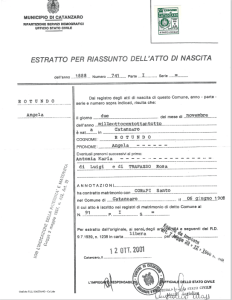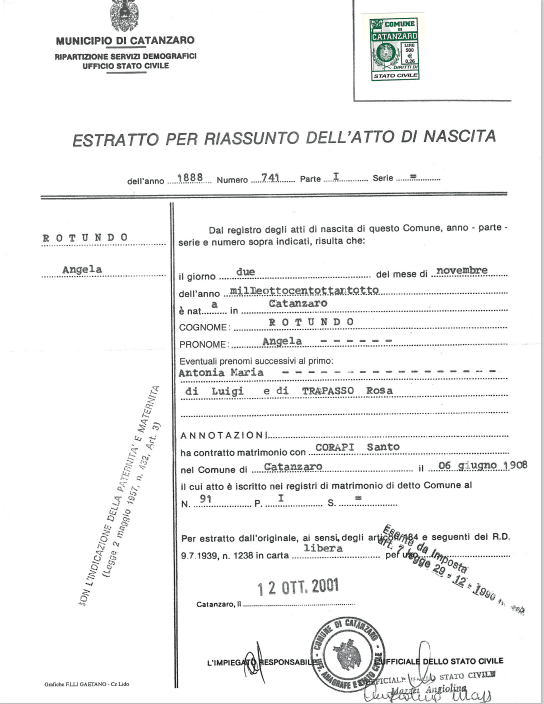The birth certificate of your Italian ancestor is mandatory in order for you to apply for Italian citizenship by descent. In addition, if your ancestor was married, or returned to Italy and died there, the marriage and death record must also be obtained. Some Italian Consulates in the US require the birth record of the Italian spouse as well. Birth, marriage, and death records are called “civil record acts” (atti di stato civile). In Italy, these civil registration records (registri dello stato civile) were and are kept at the local registrar’s office (anagrafe/stato civile) in the town or city (Comune) where the event took place. Therefore, you must determine the exact location where your Italian ancestor lived before you can find the records and the year of the event.
 Locating Italian Civil Records
Locating Italian Civil Records
Your Italian ancestor may have lived in a village, or hamlet, (frazione) that belonged to a nearby, larger town. Large cities may have civil registration from several such villages. In addition, many of the Italian ancestors listed their province of birth, instead of the actual town of birth, in their US records and when talking about their place of birth in Italy. The reason for this was that the towns were usually not known by others whereas the provinces were often recognized. So, your family may have always believed that great-grandpa Antonio was born in Naples, when in fact he was born in Acerra, a town within the province of Naples.
In addition to being registered at the Italian Town Hall, a copy of each birth record is sent to the procura della repubblica—which is similar to a district court in the United States—in the provincial capital. The duplicate is held by the tribunale (district court) because the birth records are legal documents and needed for government purposes, such as recording birth rate, statistical information pertaining to the region, and military draft during wartime,
If you are not sure of the city/town of birth of your Italian ancestor, you may need to search genealogy databases such as Ancestry.com, Family History Library, or Antenati (operated by the Italian Ministry of Cultural Heritage and Activities). This will help you to identify the place where your Italian ancestor lived and the Italian civil registration office that served that place. While copies of the Italian birth/marriage/death registries and the “acts” (the book copy containing the narrative report of the event at the Town Hall) can often be found in the online research, these are not certified copies, however, this information can be used to obtain the certified copy from the Italian Comune.
Requesting Italian Civil Records
Once you have verified the location and year of the event, the Italian record can then be ordered from the Civil Records Office. Most civil records offices will prepare an “extract summary” of the event which is acceptable for your Italian citizenship application. If it is a birth record, the names of the parents, in addition to the date of birth, must be included in the summary extract. Civil officials will generally answer correspondence in Italian. The registrar of civil records may forward your request to another location if the records have been archived at other locations.
Oftentimes, it may take a few weeks to receive a reply from the Civil Records Office. Some towns have ample staff and are able to respond to your request very promptly, while others are either small towns with a lack of staff, or large cities that are extremely busy with civil record registrations and requests and can take awhile to reply. These requests may require consistent follow up in order to acquire the documents. Knowing best practices when working with the Italian Civil Records Office can ensure a successful result. It is also important to know how to handle a “No Records Found” response. We have been obtaining Italian civil records since 2007 with staff located in Italy as well as have professionally trained genealogists on staff who specialize in locating Italian civil records. For more information, contact us.

